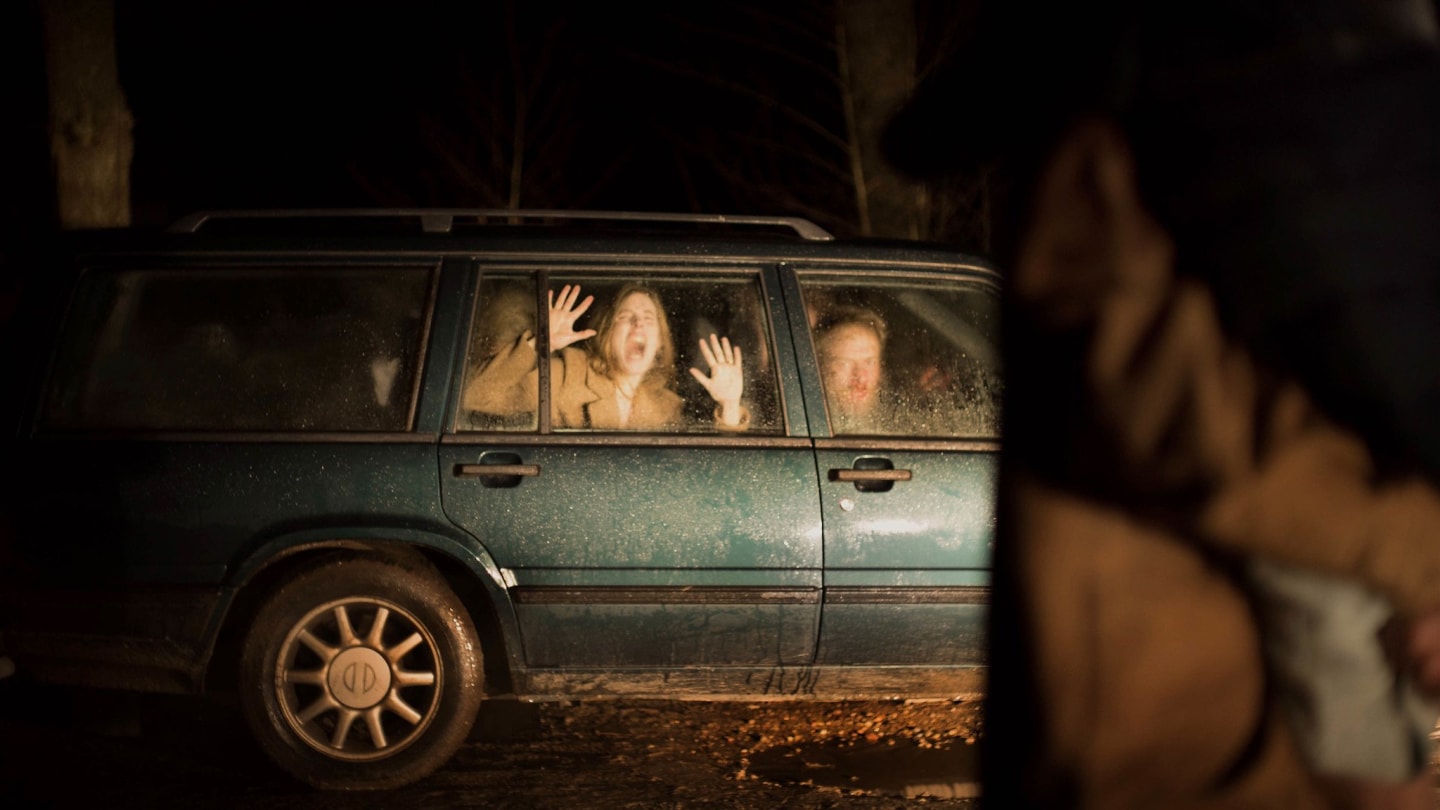 Still from the original Speak No Evil.
Shudder
Still from the original Speak No Evil.
Shudder
If you’ve been to the movies recently, chances are you’ve seen a trailer for the new horror film Speak No Evil. Previews for the James Watkins-directed horror film are so ubiquitous that it has become a running joke online that one of the best reasons to go and watch Speak No Evil in theaters is that it will be the first movie in months that doesn’t have a trailer for Speak No Evil.
The promotion for the film, at least to regular theatergoers, has been admittedly relentless but the movie has a lot to shout about. It stars James McAvoy, who Split fans will know gives good psycho, as well as Mackenzie Davis and Scoot McNairy, alumni of the underrated Silicon Valley drama Halt and Catch Fire. The premise is strong, too. “When an American family is invited to spend the weekend at the idyllic estate of a charming British family they befriended on vacation, what begins as a dream holiday soon warps into a snarled psychological nightmare.” Honestly, more scary movies should be predicated on the idea of being forced to spend time with British people.
My issue with this Speak No Evil, a movie I haven’t yet seen, isn’t its heavy-handed promotion. It’s that the 2024 version of Speak No Evil is a remake of a film made just two years ago, and threatens to overshadow a genuinely compelling work.
Speak No Evil was first made as a Danish-Belgian production directed by Christian Tafdrup and released on Shudder in 2022. It quickly became a word-of-mouth hit among horror fans looking for something a little more bone-chilling than either simple gore-fests or the often vibes-based “elevated horror” trend where the real bad guy turns out to be unresolved childhood trauma.
There was ingenuity in taking the social faux pas of befriending a couple on holiday only to discover that you aren’t quite BFFs away from that setting, pushing that politeness into a horror context. I was particularly drawn to the way the tension slowly ratcheted up as the movie progressed until the end, when the claustrophobic torment felt inescapable. Critics rightfully praised the movie and drew comparisons to 1988’s Spoorloos, one of the most bleak portraits of human cruelty you can fire up on your TV on a Friday evening.
The streaming era is guilty of many crimes with the huge amount of content needed to fill a library meaning that many gems have been lost in the deluge of options that pop up on a daily basis. “I haven’t seen it but it’s on my list” is a cliche for a reason. On the other side of this argument is that the flattening effect this flood has on titles - where everything on a carousel is broadly framed as being of equal importance - has helped push international movies and TV to audiences who may have previously not been exposed to them. It has allowed shows such as Shogun and Pachinko to pick up devoted audiences and Oscar devotees living miles from an arthouse theater access Best Picture nominees Anatomy of a Fall and Drive My Car. Speak No Evil was a beneficiary of this moment, one that should have rendered the era of English-language remakes (one you’d assume ended with Scarlett Johansson in Ghost In The Shell) a thing of the past. Apparently not.
Millions of people would surely enjoy the original version of Speak No Evil if they gave it a shot. That is presumably what Blumhouse, the production company behind this new iteration, are thinking as they greenlit a copy, drawing interested eyes away from the film’s first iteration. Michael Haneke may have remade his German language horror Funny Games in English to appeal to American audiences, but we’re no longer in 2008: the success of titles such as Parasite, Squid Game, and Money Heist showed that subtitles are no longer an obstacle to modern viewers. Even more annoying is the fact that the most common shared language between Danish and Belgian people is English, meaning a large chunk of the “foreign” version of the movie is presented in the same language as the remake. In 2024 it feels more than a little patronizing to suggest that this kind of movie only has broad mainstream appeal if it stars the guy who played Charles Xavier in the X-Men franchise.
Of course, a remake can provide filmmakers with the space to riff on the ideas laid out in the original and do something different within the pre-established parameters. Martin Scorsese’s The Departed forges its own narrative path while fleshing out the 2002 Hong Kong action thriller Infernal Affairs with stronger characters and a star role for Leonardo DiCaprio alongside Jack Nicholson. Unfortunately, the 2024 Speak No Evil deviates from the Danish version’s hellish ending and, as New York critic Louis Peitzman points out, removes the weight of the satire underpinning the horrifying action in the process. What was originally an examination of social niceties pushed to extreme lengths becomes more palatable, Peitzman says, missing the nihilism that made it so striking the first time out.
Reviews of the new Speak No Evil have, so far, been mixed. Some have praised it as “hilarious and venomous” as well as coming “pretty close to approximating the supreme squirminess of the original.” Others, however, have pointed to it being “cleaner, tamer, and less daring of the two,” as well as something that “sells the [original] material out.” It all begs the question, ‘Why bother?’